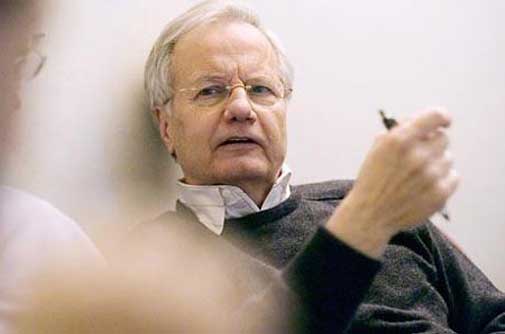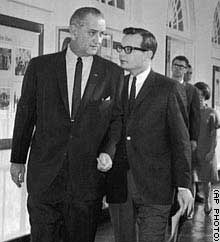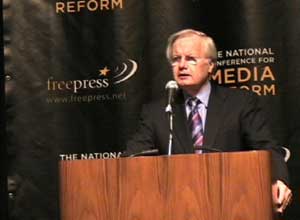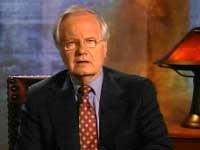
Bill Moyers will be coming back to TV in January, it was announced yesterday, with a weekly interview series called Moyers & Company, featuring one-on-one conversations with people other than the usual TV talking heads. I'm thrilled by that news, but PBS obviously isn't. The new Moyers show is offered not by the network, but offered instead to local member stations via the American Public Television distribution system.
In most markets, this will make Moyers a not-ready-for-prime-time player. Even New York's WNET, the flagship station producing the program, tentatively has scheduled Moyers & Company for 6 p.m. ET Sundays. But none of this is surprising -- neither Moyers' persistence in fighting the good fight, nor PBS's resistance to playing nice with one of its most gifted broadcasters...
There's a lot of history to consider here.

Before becoming a broadcast journalist, Moyers was the White House press secretary under President Lyndon B. Johnson. He resigned the same year, but many months before, LBJ enacted the Public Broadcasting Act of 1967, which established the Corporation for Public Broadcasting -- and, eventually, both PBS and National Public Radio. In 1971, Moyers himself became one of PBS's first seminal hires, hosting a weekly program called Bill Moyers Journal.
In 1976, he moved to CBS, establishing himself as one of the medium's most influential and impressive commentators (and, on network TV, one of the last). He returned to PBS for additional triumphs, including the 1988 landmark series Joseph Campbell and the Power of Myth (which I'm revisiting, in audio form, in my car at the moment), and NOW with Bill Moyers, the show he unveiled in 2002 -- and which incurred the wrath of then-CPB chairman Kenneth Tomlinson, who accused Moyers of, and had his show examined for, liberal bias.
Moyers stepped away from NOW in 2004, but not from the fight against what he perceived as undue, unfair pressure from above.

"My colleagues and I at NOW," Moyers said in a 2005 speech, "didn't play by the conventional rules of Beltway journalism. Those rules divide the world into Democrats and Republicans, liberals and conservatives, and allow journalists to pretend they have done their job if, instead of reporting the truth behind the news, they merely give each side an opportunity to spin the news."
Moyers named Tomlinson by name, attacking his attacker and defending his well-researched, often provocative, always thoughtful brand of journalistic inquiry and political commentary. (Tomlinson resigned that same year, after charges of misusing his post for political purposes.)
And while Moyers considered himself retired at the time, he warned that his retirement may not be permanent.
"I should put my detractors on notice," Moyers said six years ago, "they might just compel me out of the rocking chair and back into the anchor chair."
They have done that, clearly, more than once.

After returning to PBS for one more round of fine 21st-century work -- including Faith and Reason and a revival of Bill Moyers Journal -- Moyers retired again in April 2010. But after receiving a $2 million grant from the Carnegie Corporation, providing funding for two years of a new talk show, Moyers was compelled out of that rocker, and planned to return to PBS again.
The wrinkle? PBS, for whatever reason, could find no room for Moyers' new show on its schedule. In April 2011, Moyers said the idea for the new series was essentially DOA on PBS.
But only on PBS. After spending months organizing a successful end run, Moyers will be returning to public television after all. But it will be up to individual stations, not the PBS network, to program and schedule his new show.
It's a vintage Moyers solution, and typically and defiantly democratic: If you can't get satisfaction from the top down, get it from the bottom up.
All I know is, when Moyers & Company begins in 2012, he can count on my company -- as a weekly viewer.